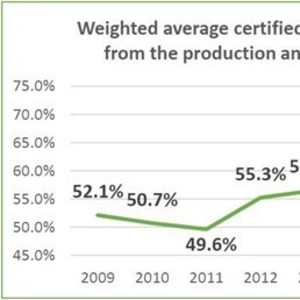European ethanol sets new high level for greenhouse gas savings

June 26, 2018
BY ePURE
European renewable ethanol delivered an average of more than 70 percent greenhouse-gas savings compared to fossil fuels in 2017, according to new certified data from European ethanol producers.
The number represents the latest of a string of annual increases in the climate-change-fighting potential of European ethanol, which has shown improved performance every year since 2011.
Advertisement
Advertisement
“For the sixth year in a row, European renewable ethanol has increased its climate-change-fighting performance,” said Emmanuel Desplechin, secretary general of ePURE, the European renewable ethanol association. “The new data confirm that ethanol produced from European crops and from waste and residues are among the most sustainable solutions the EU has to decarbonize transport. As policymakers look at how to realize Europe’s clean mobility ambitions, they need to make sure ethanol is in the mix.”
Ethanol produced by ePURE members is refined from European feedstock and works at scale in today’s vehicle fleets. According to a new study from Ricardo Energy & Environment, Europe’s push to decarbonise road transport would benefit significantly from the use of low-carbon fuels such as renewable ethanol, especially with a high percentage of cars with internal combustion engines still on Europe’s roads for decades.
Advertisement
Advertisement
The increased GHG-saving performance of European ethanol was also accompanied by increased production of animal feed (4.32 million metric tons in 2017, compared to 4.05 million metric tons in 2016) and of captured CO2 (0.77 million metric tons in 2017, compared to 0.40 million metric tons in 2016). The findings are part of a larger set of ethanol statistics from 2017 compiled from ePURE members and certified by auditing firm Copartner that will be published in September.
Related Stories
CoBank’s latest quarterly research report, released July 10, highlights current uncertainty around the implementation of three biofuel policies, RFS RVOs, small refinery exemptions (SREs) and the 45Z clean fuels production tax credit.
The U.S. Energy Information Administration maintained its forecast for 2025 and 2026 biodiesel, renewable diesel and sustainable aviation fuel (SAF) production in its latest Short-Term Energy Outlook, released July 8.
XCF Global Inc. on July 10 shared its strategic plan to invest close to $1 billion in developing a network of SAF production facilities, expanding its U.S. footprint, and advancing its international growth strategy.
U.S. fuel ethanol capacity fell slightly in April, while biodiesel and renewable diesel capacity held steady, according to data released by the U.S. EIA on June 30. Feedstock consumption was down when compared to the previous month.
XCF Global Inc. on July 8 provided a production update on its flagship New Rise Reno facility, underscoring that the plant has successfully produced SAF, renewable diesel, and renewable naphtha during its initial ramp-up.
Upcoming Events










